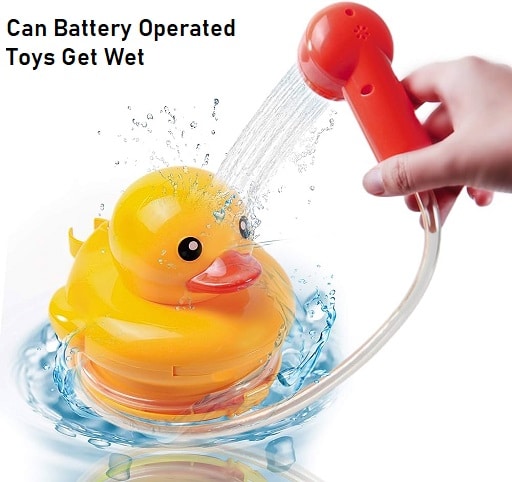When I was twenty-two years old, I wanted two things: 1. To be understood. 2. For people to think I was good at my job....Read more
Yes, battery-operated toys get wet due to having a short lifespan, the toy is rendered completely useless due to getting wet. It may even be quite hazardous.
If water seeps inside the batteries, it might produce a short circuit. It can make the batteries worthless. If the battery was to crack, detonate, or catch fire, the contents of the battery might spill into the water.
When water gets into toys powered by batteries, it must create a short circuit and kill them.
How risky is this situation? Is it possible for the batteries to overheat? How harmful is this for the person who is using it? Will anyone be surprised if they find out that my child uses this item in the bathtub? Let’s look into these questions and see what we can find about the answers.

When water comes into contact with the copper wires, the battery shell, or the PCB tracks, the battery starts electrolytic corrosion. The amount of fun that can be had with the toy quickly decreases, and repairing it becomes very difficult.
Can battery toys go in the water?
When battery toys go in the water, they get wet; toys that run on batteries might face a variety of problems, including the following:
Battery toys should be kept in a dry environment when not in use. Water can corrode or otherwise damage a battery’s safety systems. It can cause the battery to overheat, catch fire, rupture, or leak. There is a significant risk to children’s safety when toys are shipped with a partial immersion of lithium batteries.
Check the instructions
The majority of toys that are powered by batteries are not meant to be used in wet environments. The manufacturers of these toys will typically advise that you store them away from any sources of water. It will protect the electronic components and avoid any potential hazards.
You can learn whether or not the toy is completely waterproof by looking at the packaging or reading the instructions that come with it. Trust me it will save you!
Can toys with batteries go in the water?
Consumers frequently ponder whether or not their toys with batteries can be used in water. It has already been said that bringing battery-operated toys into the water is not a good idea for any reason. So let us absorb it !
The risk of receiving an electric shock and the risk of damaging the toy outweighs any potential benefits. Putting safety guidelines that the manufacturer provides for water usage is important.
Shorter life expectancy and less durability
Even after being completely submerged in water, the toy is still operational. The toy’s longevity and durability may be affected. Toys damaged by water might have their internal components wear out more quickly. Their performance suffers and eventually breaks. Sorry to hear!
Dangers to Safety
Toy batteries exposed to water are dangerous to children even after removing the water. When water and electricity are combined, dangerous situations can result. It increases the risk of accidents, electric shocks, and other types of injury.
Only by prioritizing security can one hope to lessen the impact of these threats. It is unsafe to play with toys that have been in contact with water. Save the lives and spread the message!
Can battery-operated toys electrocute you?
Yes, battery-operated toys can electrocute you. Toys powered by batteries present a potential hazard in the form of electrocution in certain scenarios. This is one way in which that might take place:
Formation of a conductive channel
Toys that are powered by batteries must be kept away from water sources such as swimming pools and bathroom sinks. When water comes into touch with the toy, a conductive channel is formed that paves the way for the flow of electricity. Because it is a conductor, water allows electrical current to pass through it.
Electrical contact with water can happen if the toy’s battery compartment, wiring, or other electrical components are broken. This could have been caused by rough play, an accident, or a lack of care for the item. All three of these scenarios are possible. Be mindful guys!
Water triggers the flow of current
The toy’s internal circuitry will be subjected to a flow of electrical current once powered on. The water enters the toy or comes into contact with any exposed or broken electrical components. It has the potential to act as a conductor and trigger the flow of current.
If humans touch the water themselves, the electrical circuit will be completed. As the electrical current travels through their body, there is a risk that they will receive a shock from it. Toys that are powered by batteries and sometimes in the bathtub can even take you to hospital. Beware!
Can battery toys go in the bath?
Battery toys can go in the bath, depending on their manufacturing. Taking a bath may be more entertaining with the help of certain toys made specifically for use in the water. Most of these toys have a water-resistant construction, ensuring they are safe to use in moist places like the bathroom. Go waterproof !
Rechargeable Toys in Bathtub
Toys that can be used in the bathtub that are powered by batteries feature elements. Elements such as lights, noises, water sprayers, and basic motorization. They are intended to make the experience of bathing for youngsters more fun and exciting for the child.
Safe and amusing toys without batteries
It is necessary to keep in mind that not all bath toys require batteries to function properly. Many traditional toys that may be played with in the bathtub, like rubber ducks, boats, and water squirters, don’t need batteries. They are designed to be safe and amusing, even if they don’t have any electronic parts. Oh wow!
Waterproof toys with batteries
Make sure that any battery-operated bath toys you buy are labeled as waterproof. This is especially important if you plan to use the toys in the bathtub. These toys’ electronic components and battery sections have been checked. They are made of appropriate seals or safeguards to avoid harm from exposure to water.
What do bath toys serve
In addition to being a terrific opportunity for learning and exploration, having a few toys in the bath makes bathtime enjoyable. Babies enjoy bright colors, floating objects, and of course making and playing with bubbles at this period. For plastic bath toys there are some fantastic brands.
Is it safe to put battery-operated toys in water?
Putting battery-operated toys in water is only safe if the product packaging instructs you. Most toys powered by batteries can be harmed or rendered useless if accidentally exposed to water.
Electrical and water safety
Please make sure electrical and water safety. The water should never enter toy batteries as they contain electrical components. The batteries can pass the electric current outside to the ground and people. It can be very dangerous for health. One can be seriously affected by the current so it’s very crucial to take care. Don’t worry, just follow the guidelines !
Follow the instructions
Remember ! It is necessary to adhere to the instructions and recommendations provided by the toy maker to keep both the user and the toy safe. If a toy with a battery is intended to be used in water, it will include instructions regarding ensuring the user’s safety. Don’t purchase anything that comes without instructions.
Do you know? All of the toy’s electronic components, batteries, and other electronic components are vulnerable to harm if they are underwater. This damage may render the toy inoperable, cause it to lose functionality, or fail.
Avoid exposing a battery-operated toy to any water. When looking for goods that may be used for water play, you should carefully consider toys designed to be used in water. Toys that have special labels that indicate their intended purpose. Go for that label!
How do you fix a battery-operated toy that got wet?
To prevent further damage, immediate action must be taken if a battery-operated toy becomes wet. Its chances of surviving might increase. The following is a detailed instruction on how to dry out a battery-operated toy:
Take the toy’s batteries out
The toy’s batteries must first be removed as the first step. Combining water and electricity helps avoid potential adverse effects like electrical short circuits and corrosion, both of which can happen.
Shake the toy vigorously
After giving the toy a couple gentle shakes to get rid of the extra water, allow it to air dry. After that, make sure the toy’s exterior is completely dry by wiping it down with a soft cloth or towel. The interior of the battery holders, the buttons, and any other holes should be thoroughly cleaned and dried. It works I swear!
Deconstruct the toy
If the toy contains screws or other removable parts, try to take it apart. You will have easier access to the toy’s innards thanks to it. As a result, the drying procedure can be carried out more thoroughly.
What happens if a battery goes into the water?
What will happen if you submerge a battery entirely is unknown. The precise effects depend on a number of variables. the kind of battery, how it is now functioning, and how long it was submerged. Among the possible outcomes are the following:
Corrosion
Water can cause corrosion when it comes into contact with the chemical components of a battery. The battery’s effectiveness may suffer as a result. Corrosion can be harmful to battery terminals and other nearby components. The battery may perform worse, have a shorter lifespan, or stop functioning altogether. You don’t want it , right?
Battery discharge
There is a chance that the battery can leak if it gets wet. Batteries contain chemicals and electrolytes that, if swallowed or in contact with the skin, can be quite dangerous. Batteries that leak their contents can harm the surrounding area as well as the nearby things.
Circuit breaker.
Water has the ability to produce a short circuit because it makes it easier for electrical current to pass between a battery’s positive and negative terminals. Any improper passage of electricity results in a short circuit. This may cause overheating, an explosion, a fire, and damage to the batteries and other electronic parts.
Dangers connected to electricity
Because it is such a good conductor, water allows electricity to pass through it with ease. Anyone who comes into contact with electrically charged water or the battery connections when a battery is submerged in water runs the danger of being electrocuted or suffering physical harm. Save yourself from harm because your life matters!
Why not battery-operated toys?
Battery-operated toys have a variety of advantages, including the fact that they are convenient and enjoyable, but only some are okay with them.
Environmental pollution
Toys that require batteries to operate typically require disposable batteries, which can contribute to environmental pollution. Batteries contain chemicals that, if not disposed of or recycled correctly, can harm the environment. Batteries should be recycled wherever possible.
The manufacturing, use, and disposal of batteries all contribute to the depletion of resources. Toys that use rechargeable batteries or other components that are favorable to the environment can help cut down on environmental damage.
Disposable batteries
It’s easy for the expense of battery replacements for battery-operated toys to quickly build up and drive up the total cost of ownership. Using throwaway batteries can become expensive, particularly if the toys are played with too frequently.
Toys that are either powered by traditional or alternative energy sources may be cheaper in the long term because they do not require disposable batteries.
Battery operated VS Conventional toys
A school of thought says that conventional toys are better for the development of children because they foster free-form, imaginative, and physically demanding play. Most children can relax and take pleasure in their battery-operated toys without exerting much effort.
On the other hand, traditional toys encourage children to engage in social interaction, physical activity, and the resolution of issues, all of which are advantageous to the intellectual development of a kid. Time to get those toys!
Battery powered toys are extremely loud
Children should not listen to music louder than 75 dB, however many toys for kids can reach 85 dB or higher (ASHA, n.d.). A 90 dB sound can become 120 dB if kids hold battery powered toys close to their ears, which is exceedingly harmful.
So, Despite its portability and amusement, only some enjoy playing with battery powered toys. Because they contribute to pollution and deplete natural resources, single-use batteries are a factor that should be taken into consideration when thinking about the environment. The cost of new batteries may go up over time as well.
Either it is a battery in a toy or any other electrical thing it is best to not expose it to water. Keep them away from water and enjoy in every other way.

Related Articles:
- How To Attract Kids Towards You
- How To Make Babies Like You
- Are Kids Allowed In Dave & Buster
- Can Short Parents Have Tall Kids
- Why Do kids Wear Hoodies In The Summer
- Can Kids Eat The Adult Happy Meal
- Do 7 Year Old Kids Still Play With Toys

When I was twenty-two years old, I wanted two things: 1. To be understood. 2. For people to think I was good at my job. As a first time founder, I remember feeling under-qualified. I felt like an impostor—and it showed. I struggled to communicate my value in a way that my colleagues and potential investors could understand. I realized I needed to clarify my message and use social media as a tool to help me build my personal brand. This would help me look more credible, I thought. So I got to work. I updated my social media profiles, built a personal website, and began sharing my story online. The more content I shared, the more confident I became. And the more confident I became, the more credible I appeared. Now i am writing blogs for madeforkids.co.uk on different topics on kids.
- Latest Posts by Anna Vatuone
-
What Are The Uses Of A Drone
- -
What Are The Uses Of Playhouse
- -
How To Get A Child To Warm Up To You
- All Posts
